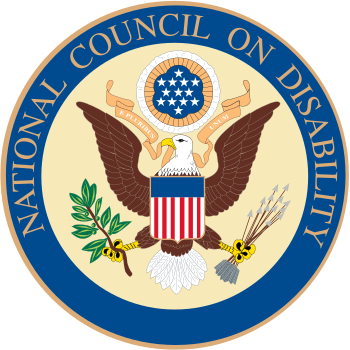| Seal of the United States National Council on Disability. (Photo credit: Wikipedia) |
On Friday, the National Council on Disability issued a letter to President Obama and Secretary Duncan concerning IDEA funding. We thank them for sharing the letter. You might consider sending a copy of this letter to your Congressional representatives. The following is the text of the letter:
February 14, 2014
President Barack Obama
The White House
1600 Pennsylvania Avenue, NW
Washington, DC 20500
The Honorable Arne Duncan, Secretary of Education
U.S. Department of Education
400 Maryland Avenue, SW
Washington, DC 20202
President Barack Obama
The White House
1600 Pennsylvania Avenue, NW
Washington, DC 20500
The Honorable Arne Duncan, Secretary of Education
U.S. Department of Education
400 Maryland Avenue, SW
Washington, DC 20202
Dear Mr. President and Secretary Duncan:
On behalf of the National Council on Disability, an independent federal agency that advises Congress and the Administration regarding laws, policies, practices, and procedures that affect people with disabilities, I write to urge you to increase funding for the Individuals with Disabilities Education Act (IDEA) in the 2015 budget. When IDEA was enacted in 1975, Congress made a commitment that the federal government would fund 40% of the additional costs needed to ensure that students with disabilities have access to a free and appropriate public education. Unfortunately, the federal contribution has never risen above 18.5%.i
While public school doors are open to students with every type of disability in the United States, inadequate financial resources make it difficult for dedicated teachers to meet their needs. Students with disabilities are the least likely of all subgroups to earn high school diplomas. In fact, the vast majority of American students with disabilities leave high school without a high school diploma.ii Because of new federal laws that deny access to federal financial aid to students without a regular high school diploma, this generation of young people with disabilities has limited access to the education and training needed to become financially independent.iii
Local school districts struggle as state budgets are reduced.iv Across the country, education funding continues to be a challenge. Despite this, our educators are pushing to raise the bar higher with more rigorous standards, tougher standardized summative assessments, and more advanced credit requirements to graduate from high school. Without additional funding and appropriate support, it will become even more difficult for students with disabilities to meet the ever-increasing demands of their school systems.
In addition to increased federal funding for students with disabilities, NCD urges the U.S. Department of Education to shift its accountability practices and hold schools to a higher standard for supporting students with disabilities to achieve higher rates of literacy and numeracy, and to earn regular high school diplomas. To date, accountability and monitoring has focused too much on procedures and paperwork and too little on how best to support students with disabilities as learners striving for success. With appropriate resources, students with disabilities can and will learn and be successful in post-secondary environments and the workforce.
Unequivocally, education is the cornerstone of a lifetime of prosperity and success. Students with disabilities must be afforded the same opportunities to flourish as their peers without disabilities. Accordingly, and consistent with the recommendations set forth in NCD’s 2002 report Individuals with Disabilities Ed Act Reauthorization: Where Do We Really Stand?,v NCD strongly recommends an increase in the 2015 budget for IDEA funding and a 10-year pathway to full funding and rigorous outcomes-based accountability.
NCD looks forward to working with the Administration to ensure that students with disabilities are given the opportunity to thrive in school and beyond. If we can be of service on this or on other related issues, please do not hesitate to call on us.
Respectfully,
Sara Gelser
Member
cc: Michael Yudin, Acting Assistant Secretary, Office of Special Education and Rehabilitative Services
i Congressional Research Service, Individuals with Disabilities Education Act (IDEA): Issues Regarding “Full Funding” of Part B Grants to States, June 5, 2005; Stateline, Pew Charitable Trusts, Sequester Hits Special Education Like a ‘Ton of Bricks’, PewStates Project, September 10, 2013, available at http://www.pewstates.org/
.
ii National Council on Disability, National Disability Policy: A Progress Report, Washington, DC: October 2011, available at http://www.ncd.gov/rawmedia_
iii Id. See also U.S. Department of Education, Federal Student Aid Handbook, Washington, DC: January 2012, available at http://ifap.ed.gov/
.
iv Stateline, Pew Charitable Trusts, Sequester Hits Special Education Like a ‘Ton of Bricks’, PewStates Project, September 10, 2013, available athttp://www.pewstates.org/
.
v National Council on Disability, Individuals with Disabilities Ed Act Reauthorization: Where Do We Really Stand?, Washington, DC: July 2002, available athttp://www.ncd.gov/
.










No comments:
Post a Comment